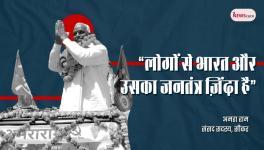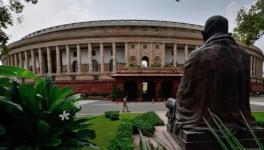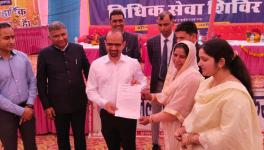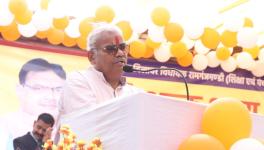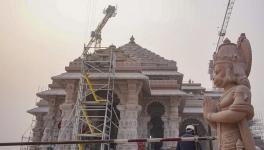Why the Rajasthan Governor Must Act on the Advice of the CM to Uphold the Constitution
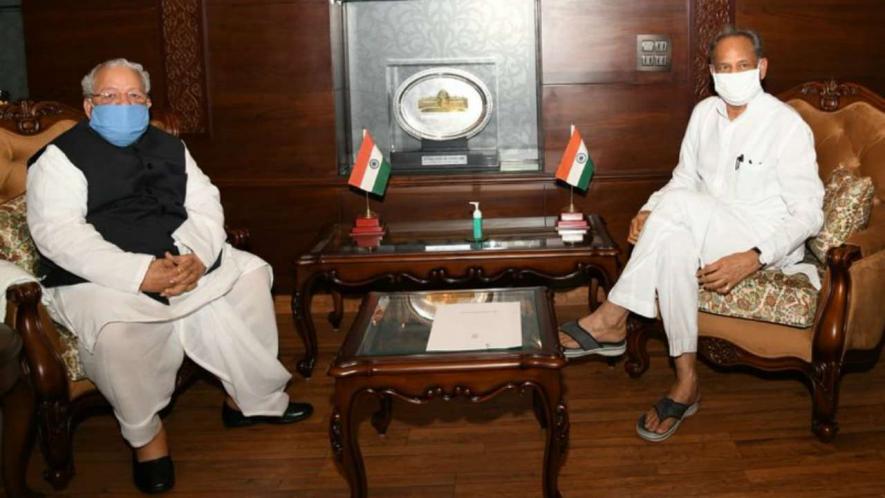
Rajasthan Chief Minister Shri Gehlot and Rajasthan Governor Kalraj Mishra. Image Courtesy: News Rush
Despite Rajasthan Chief Minister Shri Gehlot's letter dated July 23 to the state’s Governor for summoning the Assembly as per provisions of the Constitution, the Governor did not respond and sat on the letter for almost a day. This is a highly disturbing development, unheard of in the annals of our Republic. It is mandated as per Article 163 of the Constitution that the Governor has to function on the aid and advice of the Chief Minister. Also, Article 174 prescribes that the Governor of a state shall summon the assembly at a time and place, as she or he thinks fit.
These two articles have to be read together for the harmonious construction of the powers of the offices of Chief Minister and Governor. So, when the Chief Minister sends a written letter to the Governor after the cabinet’s decision to summon the Assembly, it amounts to advice given by the Chief Minister, and the Governor is constitutionally mandated to follow and implement it.
It is tragic that the Governor of Rajasthan is not acting on the basis of the CM’s letter. By him doing so, a serious constitutional crisis has been created. The inaction of the Governor on the CM’s letter is all the more perplexing when the Governor himself has admitted that the CM enjoys majority support and there is no need to convene the Assembly. Normally, the Governor of a state can ignore the advice of a CM only when he or she loses the majority support of the assembly.
Ambedkar Cautioned that Grammar of Anarchy Would Prevail in the Absence of Constitutional Methods
In his last speech in the Constituent Assembly, Dr. Ambedkar had cautioned that if constitutional methods would not be followed to pursue objectives enshrined in the Constitution, then the grammar of anarchy would prevail. The failure of the Governor to follow and adhere to the constitutional method indeed did so. It manifested itself in the avoidable conduct of the MLAs who supported Shri Gehlot and sat on dharna on the lawns of Raj Bhavan in Jaipur.
Constituent Assembly and Sarkaria Commission Affirmed that Governor Must Summon Assembly Session on CM’s Advice
In its monumental and path-breaking report, the Sarkaria Commission observed: "It is a well-recognised principle that, so long as the Council of Ministers enjoys the confidence of the Assembly, its advice in these matters(Summoning, Proroguing and Dissolving the Legislative Assembly)—unless patently unconstitutional—must be deemed as binding on the Governor."
It summed up the debates of the Constituent Assembly on this issue and noted: "The Draft Constitution provided inter alia that both in the matter of summoning the Legislative Assembly or Council and dissolving the Assembly, the Governor would be required to act in his discretion. But this provision was subsequently deleted on the ground that a Governor would not exercise any function in his discretion and would follow the advice of his Ministry in all these matters."
So, the legislative intent of the Constituent Assembly enshrined in the Constitution mandated accordingly that the Governor, with regard to matters concerning summoning the Assembly, would have to act on the advice of the Chief Minister enjoying support of the majority members of the State Assembly. Any attempt to breach it constitutes a breach of foundational norms of parliamentary democracy, which is the basic structure of the Constitution.
Presiding Officers' Conference in 1968 Stressed on Governor to Summon Assembly on the Advice of the CM
On November 6, 1967, 18 MLAs, including a minister, resigned from the ruling United Front government in West Bengal. Such resignations were interpreted as the loss of majority for the United Front government in the Assembly. The Governor wanted that Assembly session be convened on November 23 to seek a vote of confidence. However, the Chief Minister advised the Governor to summon the Assembly on December 18, as scheduled.
The Governor did not abide by the advice of the CM and dismissed the ministry. Thereupon, the Speaker of the Lok Sabha convened an emergency session of the Presiding Officers’ Conference on April 7, 1968, when a resolution was adopted. It was recommended that the Government of India should, in the light of the following observations, take urgent and suitable steps in regard to the powers of Governors to summon or prorogue Legislatures and to dismiss Ministries: “That a Governor shall summon or prorogue the Legislature on the advice of the Chief Minister. A convention shall be developed that the Chief Minister may fix the dates of summoning or prorogation after consulting the Presiding Officer concerned. The Governor may suggest an alternative date but it shall be left to the Chief Minister or the Cabinet to revise their decision or not. Where, however, there is undue delay in summoning a Legislative Assembly and the majority of members of the Legislative Assembly desire to discuss a Motion of No-confidence in a Ministry and make a request to that effect in writing to the Chief Minister, the Chief Minister shall advise the Governor to summon the Assembly within a week of such request.”
In 2016, SC Ruled Out the Discretion of Governor to Summon Assembly, Except on the CM’s Advice
In its unanimous judgement delivered on July 13, 2016, in Nabam Rebia vs Deputy Speaker of Arunachal Assembly, the constitutional bench of the Supreme Court examined whether the Governor could exercise the power of summoning the Assembly “in his discretion” or on the “aid and advice” of the Council of Ministers. The court concluded that the Governor’s discretion did not extend to powers conferred under Article 174, and hence he could not summon the House, determine its legislative agenda or address the legislative assembly without consulting the Chief Minister or the Speaker.
So, there is no ambiguity in the constitutionally enshrined provision that the summoning of the State Assembly by the Governor has to be done on the advice of the Chief Minister.
President of India Must Intervene to Uphold the Constitution
In the present context, the President of India, who appoints Governors, should intervene to uphold the Constitution. Both the President and Governors take an oath to preserve, protect and defend the Constitution of India. The actions of the Governor of Rajasthan, first to not act on the advice of the Chief Minister and summon the Assembly, and the clarifications sought by him to find out the purpose for which the session is being convened, at a time when the Chief Minister enjoys the support of the majority of the MLAs, or his query about how the Assembly session would be organised in the face of the COVID-19 pandemic, seem to be compromising the Constitution, which he is oath-bound to uphold.
While addressing the Conference of Governors in the Rashtrapati Bhavan in July 2000, then President of India, Shri K.R. Narayanan, had quoted Mahatma Gandhi. It is worthwhile to reproduce Gandhiji's words:
"While I would resent much power of interference to be given to Governors, I do not think that they should be mere figureheads. They should have enough power, enabling them to influence ministerial policy for the betterment. In their detached position, they would be able to see things in their proper perspective, and thus prevent mistakes by their Cabinets. Theirs must be an all-pervasive moral influence in their provinces."
It is all the more perplexing that the President of India is doing precious little in dealing with the errant incumbents of gubernatorial posts. One notes with sadness that in the last two decades, the actions of some of the incumbents of the office of the President of India were in conflict with the Constitution. When the former President of India, A.P.J. Abdul Kalam approved the decision of the cabinet, sent to him by Prime Minister Manmohan Singh, to dissolve the Bihar Assembly when the Supreme Court held the dissolution as unconstitutional, Shri Kalam thought of resigning from the highest office.
Former President Pranab Mukherjee approved the proclamation of President's rule in Uttarakhand and Arunachal Pradesh by dismissing the Congress Governments in those States. The Supreme Court annulled President's rule by holding that it was against the Constitution and law laid down in Bommai Judgement. President Kovind's decision to approve the disqualification of 31 MLAs of the Delhi Assembly belonging to the Aam Aadmi Party – without hearing them – and the decision of the Delhi High Court that such disqualifications were not consistent with the principles of natural justice, yet again proved the point that the Constitution and the law is violated because of the lack of serious application of mind. Such violations of the Constitution and constitutional methods by the decisions of the Government and the President of India pose a serious danger to our Republic.
Cultivation of Constitutional Morality Required to Uphold Constitution
At a time when the Constitution and institutions of our republic are in mortal danger from authoritarian leaders promoting majoritarianism and endangering the idea of India, it is a categorical imperative to cultivate constitutional morality in a comprehensive manner to save our Republic. Application of constitutional method based on the clarion call of Dr. Ambedkar to "Educate, Organise and Agitate", constitutes the method to deepen public reasoning so that people remain ever-vigilant to defend our Constitution.
The Sarkaria Commission thoughtfully stated that “the part which the Governor plays to help maintain the democratic form of Government in accordance with the Constitution is of vital importance. In the ultimate analysis, due observance of the Constitutional provisions is the soundest guarantee of enduring unity and integrity of the nation.”
The writer was OSD and Press Secretary to the former President of India late Shri K.R. Narayanan
Get the latest reports & analysis with people's perspective on Protests, movements & deep analytical videos, discussions of the current affairs in your Telegram app. Subscribe to NewsClick's Telegram channel & get Real-Time updates on stories, as they get published on our website.












